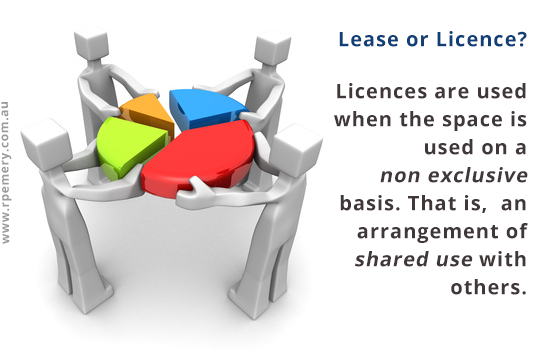Leases and Licences are types of agreements that can be used to allow a person to occupy land or a building owned by another in return for rent or a licence fee.
If you are thinking of implementing either a Lease or a License, you should be aware of the differences of each of these documents.
A licence is generally a more informal agreement. Often the licensee does not have exclusive possession of the premises – others are able to access the premises, most likely the landlord or other licensees sharing the space.

Certain lease transactions are defined by law
Retail and residential Leases are both heavily regulated in Australia by state retail and residential tenancy law.
If your Lease falls under the retail or residential lease legislations in your State, you cannot contract out of your obligations by entering into a Licence instead of a Lease in order to avoid your obligations under the law.
The state based legislation contains extensive definitions on what transactions are considered to be retail and residential leases. It also sets out certain practices and procedures that must be complied with for these types of Lease transactions.
The exact definition and types of leases which fall under a retail shop lease will differ slightly from state to state. Generally, retail leases are leases of premises which are intended to be used wholly or predominantly for the retail sale of goods or services to the public. Click for more information on retail leases..
Residential leases are leases of premises to be used or intended to be used as a residence.
Another type of popular lease is a commercial lease. Examples include leases of warehouses, factories, offices and industrial property. Click here for more information on commercial leases.
A licence confers non-exclusive possession of the premises
There are certain factors to consider when determining whether a licence has been created. The most important criterion to consider is whether the right to possession is exclusive or non-exclusive.
Non-exclusive possession of the premises points to a licence, whereas exclusive possession of a premises will usually be considered a lease.
Additionally, a licence will not usually contain the language or provisions commonly found in leases, such as:-
- using terms such as ‘tenancy’, ‘demise’ and ‘lease’ – this points to a Lease;
- provisions permitting the licensor to enter and inspect premises, or to enter and determine on non-payment of fees or promising quiet enjoyment. Such provisions point to a lease since they indicate an intention to give the occupant exclusive possession.
In contrast, provisions that require the licensee not to impede the licensor’s right of possession and control of the premises point to a licence, since they indicate non-exclusive possession.
A Lease usually contains the following terms
Generally, a lease is created whenever one person gives another:-
- the right of exclusive possession;
- for a certain period being a certain term or if not certain, capable of being calculated;
- with the intention to give the tenant an interest in the land rather than a personal privilege.
A licence is not as formal as a lease
A licence is generally not as formal as a lease. A licensee does not enjoy many of the rights held by tenants under a lease.
A lease grants the tenant a leasehold interest in the land
A lease grants the tenant a leasehold interest in the land. A licence gives the licensee a contractual right to access the land.
Examples of licences
Following are some examples of where a licence may be appropriate:-
Tip: If the property will be shared with others, or others will be coming or going (non-exclusive possession), than you will most likely need a licence.
Examples of leases
Following are some examples of Leases:-
Related articles:-
You may be interested in reading about these related topics:-
Commercial Retail Tenancy Leasing Laws
Commercial Sublease Agreements
Novated Lease
Tenants in Common Agreement
The Importance of Registering a Commercial Property Lease
Legal kits and lease documentation:-
Licence Agreement Kit for serviced office
Licence Agreement Kit for storage space

